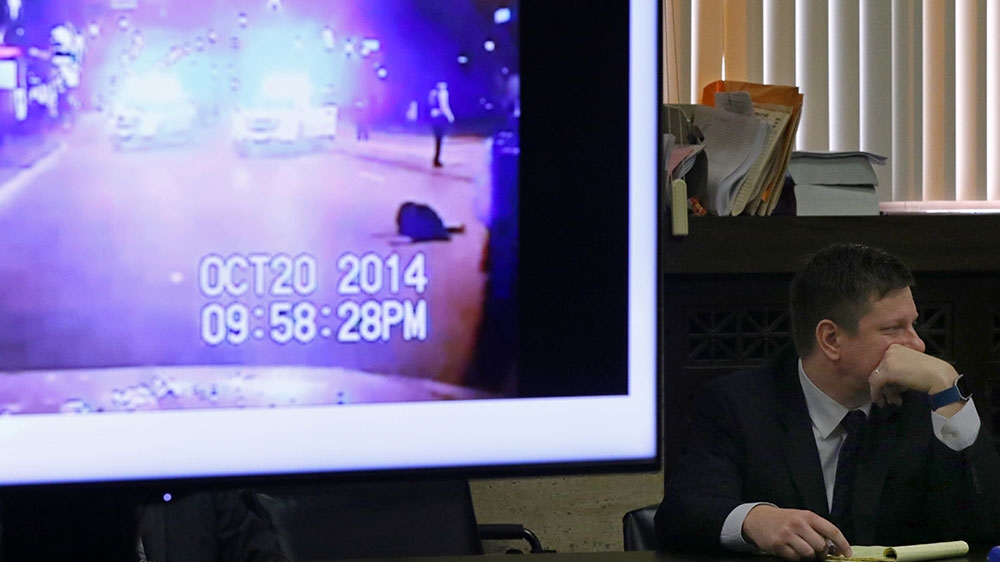Chicago braces for verdict in trial of cop who killed black teen
Chicago, Illinois – A jury in Chicago began its deliberation on Thursday in one of the most closely-watched murder trials in recent memory in a city riven by racial divides, gun violence and police brutality.
Jason Van Dyke, a white Chicago police officer, shot 17-year-old Laquan McDonald 16 times on the night of October 20, 2014 as the African American teen, carrying a knife and ignoring police commands, appeared to walk away from him along a roadway.
At first, Van Dyke claimed to act in self-defence, but dashboard camera footage of the incident released a year later after a Freedom of Information Act request appears to showed otherwise, prompting massive public outcry and protests.
Van Dyke is charged with two counts of first-degree murder, 16 counts of aggravated battery, and one count of official misconduct. Three other officers are separately on trial for allegedly covering up Van Dyke’s actions.
The trial has riveted Chicago after years of fallout from the video’s release, including the firing of the city’s police chief, the ousting of the Cook County State’s Attorney and a federal investigation into the Chicago Police Department.
Dramatic moments in trial
The last few days in court included some of the trial’s most dramatic moments.
On Wednesday, Van Dyke stuck by his claim that he feared for his safety because McDonald was advancing on him with “bugged out” eyes, raising and pointing his knife. He said he needed to keep shooting because the McDonald continued to clutch the knife while was on the ground.
But the prosecution highlighted how many other officers did not shoot McDonald and instead had called for a taser to take him down non-fatally.
In another key moment, a psychologist said Van Dyke told him in a post-incident evaluation that he told his partner that they would “have to shoot this guy”, a possible indication of the officer’s intent before he encountered McDonald.
 |
| Chicago police Officer Jason Van Dyke looks on during his murder trial as a monitor displays a scene from a police vehicle dash cam video, moments after the shooting death of Laquan McDonald [John J. Kim/Chicago Tribune/Reuters] |
Robert Clarke, a criminal lawyer and former alderman in the city, said the verdict could go either way.
“Much of the testimony in [Van Dyke’s] defence was not borne out of the details off the video. You don’t see someone slashing and waving a knife in the direction of the police,” Clarke told Al Jazeera. “On the other hand, how can you get into the mind of a police officer who feels that someone can run at him with a weapon in his hand? … I can see it from both ways.”
A potential “compromise” could be to convict Van Dyke of second-degree murder, meaning Van Dyke unreasonably acted in self-defence, said lawyer Tony Thedford, who previously sued Van Dyke in a separate case and specialises in police misconduct cases.
“If I was representing Van Dyke, that’s what I would be attempting to achieve,” Thedford told Al Jazeera of a second-degree charge, adding that if convicted of second-degree murder the maximum he would serve behind bars would likely be half of a 20-year sentence. The first-degree charge carries a minimum 45-year sentence.
Communities, schools, police prepare for verdict
The city is bracing for the verdict and its potential aftermath.
Activists have already called for a demonstration outside City Hall for after the verdict is announced.
William Calloway, a black activist who filed the Freedom of Information Act request that led to the release of the dashboard camera video, said protesters should “completely shut down the city” if Van Dyke is not convicted.
“[If he is convicted] I think it will be a spirit of jubilee throughout the city, particularly in the African American parts of the city, and people will start to have a sense of hope in he law enforcement,” he told Al Jazeera.
“It will be the polar opposite if he is acquitted or there’s a hung jury. The jubilee will turn into anger and we’ve seen what anger can turn into in the past in other cities where police shootings have occurred.”
 |
| Laquan McDonald was shot 16 times by Chicago Police Department Officer Jason Van Dyke in 2014 [File: Paul Beaty/AP Photo] |
Police beefed up their presence across the city on Thursday, including along Michigan Avenue, an upscale thoroughfare where protesters blocked traffic and holiday shopping in late 2015 after the dash cam footage was release.
The Chicago Police Department told local media that it had a “comprehensive operating plan to ensure public safety in all of our neighborhoods while simultaneously protecting the rights of peaceful demonstrations”.
Schools are also gearing up for “potential civil unrest”, said Leeandra Khan, CEO of Civitas Education Partners, which operates four Chicago schools including three on the city’s mostly black south and west sides.
Khan told Al Jazeera she has been in touch with the Chicago Police Department who are deploying more officers around schools and preparing to make safe passageways in case students walk-out in protest of the verdict.
She said her schools are also preparing for the trial’s impact on campus, by holding after-school forums with social workers for students to “get off their chest” any feelings related to the shooting and the trial. They’ve also given additional lesson plans to teachers to help facilitate sensitive discussions during class time.
“We know this is gonna come up in classrooms,” she said. “At one of my schools a lot of my students come from the west side, so it will be talked about a lot in the community, and when they come back to school there will likely be a response.”




